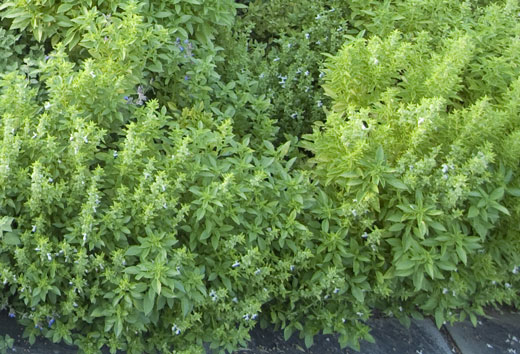If you're getting ready to create or add to your garden, you're probably searching for some good plant options. You could use the same old perennials, or you could choose some plants that do double duty.
Keeping the bugs away
Pesky mosquitoes, flies, ticks, and other pests can turn your outdoor area into a no-man's land. But there are several plants that will help keep them away while snazzing up your garden.
Mosquitoes
Nothing is more irritating than not being able to use your yard because the mosquitoes have taken over. Plant a few of these beauties and you'll be able to keep them at bay:
![]() Lavender— "The best variety is lavandin, which has a high concentration of camphor, which keeps bugs far away," said Good Housekeeping.
Lavender— "The best variety is lavandin, which has a high concentration of camphor, which keeps bugs far away," said Good Housekeeping.
![]() Lemon balm—Bugs hate the lemony scent.
Lemon balm—Bugs hate the lemony scent.
![]() Basil—"It's one of the few plants that emit a strong scent without having to crush the leaves," they said.
Basil—"It's one of the few plants that emit a strong scent without having to crush the leaves," they said.
![]() Mint—This is just one of the many uses of this functional, fresh-smelling plant.
Mint—This is just one of the many uses of this functional, fresh-smelling plant.
![]() Catnip—The bonus is it'll make your cat happy too.
Catnip—The bonus is it'll make your cat happy too.

Good Housekeeping
Flies
Live in an area where flies can be a menace during the summer? "Fortunately, there are several herbs and plants that not only repel flies, but are also attractive to look at and pleasantly fragrant to people," said Natural Living Ideas. "They include sweet basil and citronella grass."

Arizona Home and Garden
Plants like bay laurel keep flies away and "can also be used to keep moths out of closets, mice and roaches out of your pantry, and bugs out of grains and cereals," said Natural Living Ideas. Not only is lavender renowned for its sweet scent, but it's also "perfect for ornamental planting around doors and under windows…for its insect-repelling qualities. Lavender repels fleas, moths, and mosquitoes in addition to flies."
Ants
Growing mint in your garden can prove useful in many ways, starting with its ability to keep ants away. "Placing fresh mint in pantries helps deter ants, hanging sachets of dried mint in closets helps deter moths and flies (mint tea bags work as well), and rubbing crushed mint leaves on the coats of your cats and dogs can help deter biting insects," said Christianson's Nursery.

Southern Living
Because mint can be invasive, Christianson's recommends planting it carefully. "The downside is that mint is an invasive plant. Instead of planting it directly in a veggie or ornamental garden, you may want to plant it in a contained area, or use it in pots placed around outdoor living spaces or near your herb garden."
Ticks
If you live in an area where ticks can be an issue, Christianson's recommends the following plants, which can ward them off:
![]() Lavender
Lavender ![]() Garlic
Garlic ![]() Pennyroyal
Pennyroyal ![]() Pyrethrum
Pyrethrum ![]() Sage
Sage ![]() Beautyberry
Beautyberry ![]() Eucalyptus
Eucalyptus
Attractive and edible
Looking good is one thing. Tasting good is another. Why choose when you can have both ends covered?
"Kale is one of the most popular edible plants in ornamental gardens," said horticulturist Noelle Johnson on Houzz. "The ruffled edges and purple veins are very attractive and add both texture and color contrast to the garden. Swiss chard is another good choice that "adds vibrant color…with its multicolored stalks and veins running through dark green leaves."

BloomIQ
Medicinal value
The right kind of plants in your garden can also have a positive impact on your health.
"Before there was modern-day medicine and its pharmacopeia of synthetic drugs, there were plants, and ancient civilizations knew how to use them strategically to treat common ailments and even life-threatening diseases," said Mercola.com. You can "harness the power of medicinal plants" like peppermint, which "offers benefits to the respiratory system, including for coughs, colds, asthma, allergies, and tuberculosis."

Herb Gardening
Thyme is another good choice for its antioxidant properties. "Thyme contains health-boosting flavonoids including apigenin, naringenin, luteolin, and thymonin, and has been shown to protect and increase the percentage of healthy fats found in cell membranes," said Mercola. "Thyme is also nutrient dense, containing vitamin C, vitamin A, iron, manganese, copper, and dietary fiber."






